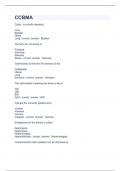Table of Contents
Chapter 1 Seeing Older Adults Through the Eyes of Wellness ....................................................... 2
Chapter 2 Addressing Diversity of Older Adults............................................................................ 13
Chapter 3 Applying a Nursing Model for Promoting Wellness in Older Adults .............................. 25
Chapter 4 Theoretical Perspectives on Aging Well ....................................................................... 36
Chapter 5 Gerontological Nursing and Health Promotion ............................................................. 47
Chapter 6 Health Care for Older Adults in Various Settings ......................................................... 59
Chapter 7 Assessment of Health and Functioning........................................................................ 70
Chapter 8 Medications and Other Bioactive Substances .............................................................. 79
Chapter 9 Legal and Ethical Concerns ......................................................................................... 91
Chapter 10 Elder Abuse and Neglect ......................................................................................... 103
Chapter 11 Cognitive Wellness .................................................................................................. 124
Chapter 12 Psychosocial Wellness ............................................................................................ 133
Chapter 13 Psychosocial Assessment ....................................................................................... 140
Chapter 14 Impaired Cognitive Function: Delirium and Dementia .............................................. 168
Chapter 16 Hearing.................................................................................................................... 194
Chapter 17 Vision ...................................................................................................................... 204
Chapter 18 Digestion and Nutrition ............................................................................................ 222
Chapter 19 Urinary Function ...................................................................................................... 233
Chapter 20 Cardiovascular Function .......................................................................................... 244
Chapter 21 Respiratory Function ............................................................................................... 256
Chapter 22 Safe Mobility ............................................................................................................ 267
Chapter 23 Integumentary Function ........................................................................................... 278
Chapter 24 Sleep and Rest ........................................................................................................ 288
Chapter 25 Thermoregulation .................................................................................................... 299
Chapter 26 Sexual Function ....................................................................................................... 315
Chapter 27 Caring for Older Adults During Illness ...................................................................... 328
Chapter 28 Caring for Older Adults Experiencing Pain ............................................................... 339
Chapter 29 Caring for Older Adults at the End of Life................................................................. 349
1|Page
,Chapter 1 Seeing Older Adults Through the Eyes of Wellness
1. In 2010, the revised Standards and Scope of Gerontological Nursing Practice was
published.The nurse would use these standards to:
a. promote the practice of gerontologic nursing within the acute care setting.
b. define the concepts and dimensions of gerontologic nursing practice.
c. elevate the practice of gerontologic nursing.
d. incorporate suggested interventions from others who practice
gerontologicnursing.
ANS: D
The current publishing of the Standards and Scope of Gerontological Nursing Practice in 2010
incorporates the input of gerontologic nurses from across the United States. It was not
intendedto promote gerontologic nursing practice within acute care settings, define concepts
or dimensions of gerontologic nursing practice, or elevate the practice of gerontologic nursing.
DIF: Remembering (Knowledge) REF: MCS: 2 OBJ: 1-1
TOP: N/A MSC: Safe and Effective Care Environment
2. When attempting to minimize the effect of ageism on the practice of nursing older adults,
anurse needs to first:
a. recognize that nurses must act as advocates for aging patients.
b. accept that this population represents a substantial portion of those
requiringnursing care.
c. self-reflect and formulate ones personal view of aging and the older patient.
d. recognize ageism as a form of bigotry shared by many Americans.
ANS: C
Ageism is an ever-increasing prejudicial view of the effects of the aging process and of the
olderpopulation as a whole. With nurses being members of a society holding such views, it is
critical that the individual nurse self-reflect on personal feelings and determine whether such
feelings will affect the nursing care that he or she provides to the aging patient. Acting as an
advocate is an important nursing role in all settings. Simply accepting a fact does not help end
ageism, nor does recognizing ageism as a form of bigotry.
2|Page
,DIF: Applying (Application) REF: N/A OBJ: 1-9
TOP: Teaching-Learning MSC: Safe and Effective Care Environment
3. When discussing factors that have helped to increase the number of healthy, independent
olderAmericans, the nurse includes the importance of:
a. increased availability of in-home care services.
b. government support of retired citizens.
c. effective antibiotic therapies.
d. the development of life-extending therapies.
ANS: C
The health and ultimate autonomy of older Americans has been positively impacted by the
development of antibiotics, better sanitation, and vaccines. These public health measures have
been more instrumental in increasing the numbers of healthy, independent older Americans
thanhave in-home care services, government programs, or life-extending therapies.
DIF: Remembering (Knowledge) REF: MCS: 2 OBJ: 3-3
TOP: Nursing Process: Implementation MSC: Health Promotion and Maintenance
4. Based on current data, when presenting an older adults discharge teaching plan, the
nurseincludes the patients:
a. nonrelated caretaker.
b. paid caregiver.
c. family member.
d. intuitional representative.
ANS: C
Less than 4% of older adults live in a formal health care environment. The majority of the
geriatric population lives at home or with family members.
DIF: Applying (Application) REF: N/A OBJ: 3-3
TOP: Nursing Process: Planning MSC: Safe and Effective Care Environment
5. The nurse planning care for an older adult who has recently been diagnosed with
3|Page
, rheumatoidarthritis views the priority criterion for continued independence to be the patients:
a. age.
b. financial status.
c. gender.
d. functional status.
ANS: D
Maintaining the functional status of older adults may avert the onset of physical frailty and
cognitive impairment, two conditions that increase the likelihood of institutionalization.
DIF: Remembering (Knowledge) REF: MCS: 8 OBJ: 1-6
TOP: Nursing Process: Planning MSC: Physiologic Integrity
6. A nurse working with the older adult population is most likely to assess a need for a financial
social services referral for a(n):
a. white male.
b. black female.
c. Hispanic male.
d. Asian American female.
ANS: B
The poverty rate among older black women is substantially higher than that seen among males
orfemales of other ethnic groups. White males had the least poverty.
DIF: Applying (Application) REF: N/A OBJ: 1-4
TOP: Nursing Process: Assessment MSC: Safe and Effective Care Environment
7. Which of the following statements made by a nurse preparing to complete a health
assessmentand history on an older patient reflects an understanding of the general health
status of this population?
a. Ill need to document well regarding the medications the patient is currently
prescribed.
b. I would like to understand how supportive the patients family members are.
4|Page


